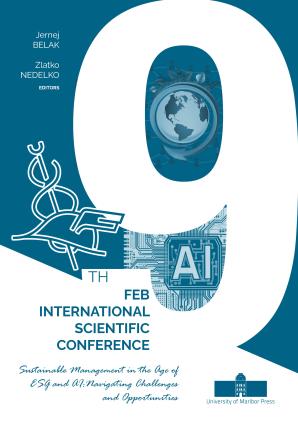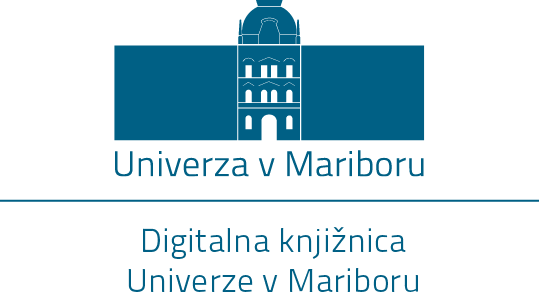9th FEB International Scientific Conference: Sustainable Management in the Age of ESG and AI: Navigating Challenges and Opportunities
Ključne besede:
trajnost, ESG, UI, gospodarsko okolje, akademsko okoljeKratka vsebina
9. mednarodna znanstvena konferenca: Trajnostno upravljanje v dobi ESG in umetne inteligence: Soočanje z izzivi in priložnostmi. Ekonomsko-poslovna fakulteta Univerze v Mariboru je v sooragnizaciji Rajagiri Business School, Kerala, India, organizirala 9. mednarodno znanstveno konferenco z naslovom Sustainable Management in the Age of ESG and AI: Navigating Challenges and Opportunities. Mendarodna znanstvena konferenca je združila mednarodne raziskovalce, strokovnjake in praktike, ki so razpravljali o trajnostnem upravljanju v kontekstu naraščajočega pomena okoljskih, socialnih in upravljavskih (ESG) dejavnikov ter hitrega razvoja umetne inteligence (UI). Udeleženci so predstavili znanstvene prispevke, ki so obravnavali izzive in priložnosti, povezane z vključevanjem ESG načel in naprednih tehnologij v strateške in upravljavske procese. Dogodek je omogočil interdisciplinarno izmenjavo znanja ter spodbudil povezovanje akademskega in gospodarskega okolja z namenom razvoja inovativnih in odgovornih praks upravljanja za trajnostno prihodnost.
Poglavja
-
Sustainable Management and Business in the Area of Grocery Shopping - The Efficiency of Grocery Shopping (EOGS) Project
-
The Role of Sport Innovation in Global Economics -The Hungarian Case
-
Sport Development via Sustainable Urban Land Use - The Case of Győr, Hungary
-
Comparative Analysis of the Regional Operation of the Just Transition Fund Based on Territorial Development Plans and Best Practices
-
Validation of the Short Form of the Remote Work Stress Scale
-
The Role of Artificial Intelligence in Enterprise Resource Planning (Erp) Systems
-
The Impact of Financial Intermediation on Economic Growth: An Econometric Analysis for the Western Balkan Countries
-
Sustainability and Complementarity of Agriculture and Rural Areas in the EU
-
Environmental, Social, and Governance (ESG) Performance and Economic Growth: An Econometric Analysis for Central European Countries
-
Evaluation of the Impact of the Introduction of EN Iso 9001: 2015 in an Engineering Company
-
A Comprehensive Examination of the Impacts of the Circular Economy Within the ESG: Evaluating New Metrics and Interactions
-
The Potential of Artificial Intelligence in Addressing Climate Change
-
The Impact of Regulation on CSR: An Assessment of CSRD Compliance and the Implications of the Omnibus Regulation
-
Bridging Traditional and Digital Industrial Symbiosis: Comparative Insights From Croatia and Slovenia in the ESG and Digital Transformation Era
-
The Impact of Intelligent Process Automation on Audit and on Junior Auditor’s Skills
-
Corporate Social Responsibility in the Digital Era: The Role of Emotions in Business Decision-Making and Operational Processes
-
An Analysis of the Social and Linguistic Construction of Artificial Intelligence
-
Public-Private Partnerships for Green Skills: Evaluation of Different Stakeholders Under the Shadow of Game Theory Model
-
The Evolution of Energy Awareness in Hungary: Examining Consumer Awareness, Attitudes and Individual Responsibility in the Context of the Energy Crisis
-
AI-Powered Cryptocurrencies and Sustainability: The Role of Intelligent Blockchains in Green Technology Development
-
The Role of Artificial Intelligence and Electronic Intrusion Detection Systems in Protecting Solar Power Plants
-
Digital Transformation in the Hotel Industry: A Study of Four-Star Hotels in Szeged
-
Sustainable Corporate Governance and Stakeholder Engagement: Analyzing the Role of Stakeholder Integration in ESG Reporting
-
Digital and Hybridization Business Models: Contribution to Sustainable Transition
-
The Role of Universities in Sustainable Transformation
-
The Role of Artificial Intelligence in Eliminating Language and Cultural Barriers in Cross-Border E-commerce
-
The Role of Experience in AI Adoption: The Moderating Effect on Predictors of ChatGPT Usage Intention Among Generation Z
-
Socially Responsible Employment: Expectations of New Entrants in Hungary
-
Cost-Benefit Analysis in Sustainable Tourism: Best Practices and Policy Implications
-
AI-Related Terminology in English as a Reflection of AI Application in Business – A Corpus-Driven Study
-
Personal Purpose as a Key Driver of Commitment in Public Organizations: The Role of Purpose Identification
-
The Role of AI in Energy Usability and Efficiency: Opportunities and Limitations
-
Work-Related Stress and Company Size – It Industry in Croatia
-
Contemporary Teaching and Learning Strategies for Future Competencies
-
Impact of Fiscal Policies on the Economic Growth of Kosovo, Albania and North Macedonia
-
Gender Equality and the ESG Performance: An Index-Based Comparative Analysis of Hungary, Czechia, Poland, and Spain With a Focus on the Gender Pay Gap
-
Quantitative Frameworks for Investigating the Relationships Between Sustainability Factors and Lifelong Learning
-
Impact of AI in Human Resource Management (HRM), Focusing on Recruitment and Selection
-
Leveraging AI-Driven Supply Chain Analytics for Accelerating the Circular Economy: A Focus on Real-Time Resource Management and Extended Product Life-Cycles
-
Criteria to Support the Transition Towards Circular Supply Chains – Integrating Legal, Practical and Academic Perspectives
-
A T-Shaped Perspective for Building Holistic Sustainability Reporting in the Digital Era
-
The Impact of Global Crises on Employment and Talent Needs in the It Sector: A Time-Series Analysis of COVID-19 Disruptions and AI-Driven Adaptations
-
AI and ESG-Driven Green Innovation in the Middle East: Overcoming Barriers to Sustainable Technology Adoption
-
Polish Agriculture on the Road to Sustainable Agriculture
-
Comparative Analysis of the Role of Gender Equality in Environmental, Social, and Governance Performance Across Belgium, Denmark, Luxembourg, and Hungary
-
Cybersecurity in E-banking
-
Smart Energy, Conscious Future: The Role of Artificial Intelligence in Energy Efficiency
-
What Are the Specific Challenges for SMES in Complying With ESG Reporting?
-
What Would the Younger Generation Give Up for a Better, More Sustainable Future?
-
Cost Optimization Through Quality Management for a Sustainable IT Company
-
Evaluating the Effectiveness of EU Sanctions On Russian Financial Markets: A Garch-Based Approach
-
The Influence of Ideology on Innovation as Manifesting Imagination: The Case of Tescreal and AGI
-
The Impact of ESG Reporting on Corporate Reputation and Crisis Communication Strategies in the Age of AI
-
Energy-Intensive Industries - A Brief Overview of Milestones Supported by Diversity Index Data
-
Do Masculine CEOs in High-ESG-Rated Companies Avoid Committing Fraud? Evidence From European Countries
-
The Role of Social Media in the Implementation of Sustainable Marketing: Consumer Behavior, Brand Engagement, and Green Consumption
-
Tourism and Sustainability: Exploring the Role of AI-Driven Tourism Practices in Shaping Consumer Sustainable Behaviour
-
The Tax Competition in Turbulent Times: The Race to the Bottom in European OECD Economies
-
From Insight to Impact: How AI Tools Transform Managerial Practice in Czech Companies
-
Revolution in Project Management: Focusing on Sustainability and AI
-
Assessing Measurable Financial and Sustainability Data for Agricultural Competitiveness
-
Macroeconomic Adjustments Under the Pitfalls of Quantitative Easing in the EU: Balancing Economic Growth and Inflation Across Monetary Regimes
-
Capacity Building, Management and Sustainability Values
-
Integrating Mediation in the Corporate Culture as a Sustainable Practice
-
Decision Making, Artificial Intelligence, and ESG Regulations
-
The Impact of Environmental, Social and Governance Reporting on Corporate Performance of Energy and Minerals Sector in South Africa
-
Integrating ESG, AI, and Financial Strategies in Banking: Advancing Sustainable Innovation and Risk Management
-
The Legal Implications of AI in Corporate Governance From Directors’ Responsibilities to Regulatory Evolution
-
The Human Side of Digitalization: HRM’s Role in Fostering Digital Well-Being
-
Pilot Study On Pharmaceutical Waste Disposal and Its Role in Sustainable Management
-
The Impact of Relationships, Leadership and Innovation on Organisations
-
Eco-Conscious Consumerism and Purchase Intention Towards Alternative Fuel Vehicles – An Examination
-
Modelling Emotional Intelligence Development in Entrepreneurs: Strategic Approach
-
The Presentation of Financial Statements Within the Framework of the Public Sector Accounting Standards: A Comparison of DMS, EPSAS, and IPSAS
-
Uncovering the Interactions Among Barriers to Sustainable Supply Chain Management: Insights From Kerala’s Leading Textile Manufacturing Industries
-
Diversity, Equity, and Inclusion – A case of select Indian organizations
-
The Strategic Role of AI in Business Process Transformation and ESG Commitment
-
From Routine to Intuition: AI’s Role in Organization’s Governance and Management Decision-Making
Prenosi

Prenosi
Izdano
Kategorije
Licenca

To delo je licencirano pod Creative Commons Priznanje avtorstva-Deljenje pod enakimi pogoji 4.0 mednarodno licenco.





